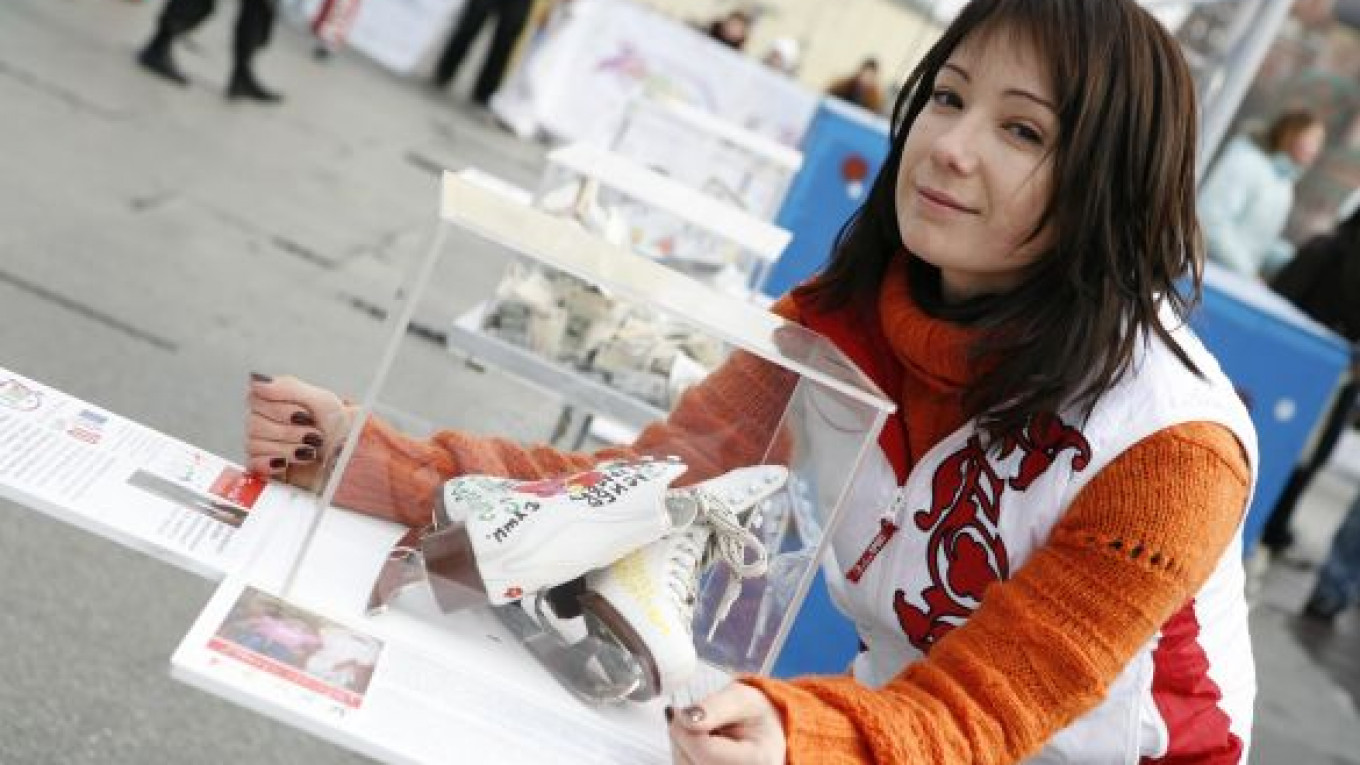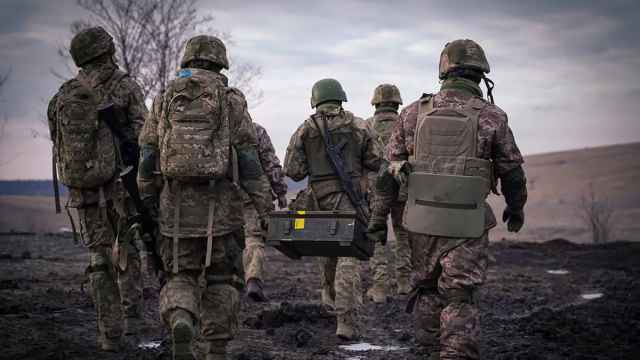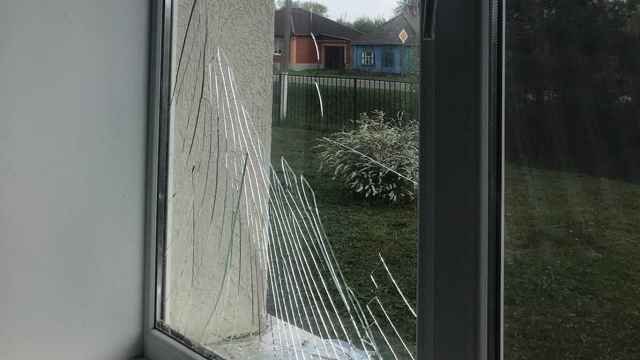The Soviet maxim "initiative is punishable" is only half true for actress Chulpan Khamatova.
The much-admired film and theater star bubbles with joy when she describes the charity she helped found and which is now one of Russia's most successful and well known. But in the same breath she speaks bitterly about the public outcry over an advertisement she participated in this spring that praised presidential candidate Vladimir Putin.
"These are compromises that I am not ashamed of making," she told The Moscow Times in an interview. "It was just a scandal for the sake of a scandal. The saddest thing is that not one of those journalists who started it tried to really look at the situation fairly."
But any lingering cynicism about politics, or the system which she says every citizen has participated in creating, is swept away by the positive emotion she exudes when she talks about the children she and others at Gift of Life have helped.
Education
1992 – Kazan State Finance and Economics Institute (degree not completed)
1993 – Kazan Theater School (degree not completed)
1999 – Russian University of Theater Arts
Selected filmography
1997 – “The Time of the Dancer,” Katya
1998 – “The Country of the Deaf,” Rita
1999 – “Luna Papa,” Mamlakat
2001 – “Viktor Vogel – Commercial Man,” Rosa Braun
2003 – “Goodbye, Lenin!” Nurse Lara
2004 – “72 meters,” Nelli
2004 – “Children of the Arbat” (TV series), Varya Ivanova
2006 – “The Sword Bearer,” Katya
2008 – “The Rainbowmaker,” Lia
2010 – “The House of the Sun,” Galina
2011 – “Dostoevsky” (TV miniseries), Maria Dmitriyevna Isayeva
Khamatova, 36, got into philanthropy by accident. She was asked in 2005 to host a concert to raise $200,000 for equipment for a children's cancer ward. She agreed, but the event fell far short of its target.
She decided to organize a bigger, better event at her beloved Sovremennik theater — famed for being the first Soviet dramatic venue to struggle against censorship when it opened during Khrushchev's thaw in 1956. She was joined by fellow film star Dina Korzun, and they wound up raising $300,000, after which the idea of starting a charity was born.
"At first I had a very negative attitude toward charitable organizations; I thought that they were vehicles for fraud," she said. "But in the end, they convinced me that I could help children in a special way."
Since 2006, Gift of Life has raised more than 1 billion rubles ($33 million) and was instrumental in convincing the government to build a state-of-the-art cancer clinic in southern Moscow, which aspires to revolutionize oncological treatment in Russia.
Khamatova, a native of Kazan, the capital of Tartarstan, attended the Kazan Theater School for a short time before being sent to Moscow by teachers who saw in her a special talent. She first shot to fame with her first big film break as the lead in Valery Todorovsky's "Country of the Deaf" (1997), a movie about blind gangsters, and gained renown among European audiences when playing a Russian nurse in the acclaimed "Goodbye Lenin!" (2003), which explored the reunification of Germany.
Her given name in the Tatar language means "dawn star." Ironically, she finds the close association of her name to the charity more disturbing than anything.
"When I hear that, I just feel horror and bewilderment," she says. "[Gift of Life] is the huge work of a large number of people, and these people are always in the shadows. … I cannot stand this."
Though she does acknowledge that her fame benefits the charity, she doesn't like being used. "You are in the public eye, and everyone has the right to use you."
Khamatova has since stopped her cinema work because she found that the extra commitments caused by filming made life difficult for her theater colleagues. It is this sense of selflessness that defines her role at Gift of Life.
This interview has been edited for length and clarity.
Q: Why did you found Gift of Life?
A: When Dina Korzun and I first did a fundraiser together, we didn't really want a charity fund. We just wanted to have the opportunity to raise money for equipment and stop there. Then a law changed that allowed hospitals to use charity funds. In the hospital that we help, there are a lot of different departments — it's a huge hospital and we helped children linked with oncology. The funding and wages there are disparate in relation to other illnesses.
By just doing fundraisers, we could not guarantee to the people from whom we were asking money that the funds would be going where we said. Galina Chalikova, who was our director and initiator of the fund until she died last year of cancer — an unbelievably unique person — told us that the only way to fully secure the help that we had received from people was to register a foundation, so that we were not dependent on any particular [government] tenders.
We knew that we could rely on the people that we were gathering, and they knew that what we were doing was honest. At first, I had a very negative attitude toward charitable organizations — that they were vehicles for fraud. But in the end they convinced me that I could help children in a special way, so we registered the foundation.
Q: What are the biggest problems you have faced in your work with the charity?
A: At the moment we have a problem that really worries us. It is that the foundation is always linked with my name. It's a problem for me because I want it to be able to live a separate life, that Gift of Life has the reputation that we are all building it together. I want my own personal decisions and predilections to not affect the charity's work in any way. That the foundation would be separated from the name Khamatova. Maybe that it becomes like in the West, where there are a number of trustees who just guarantee the integrity of the help given by the charity. But I don't want people saying that it is "Khamatova's fund"; when I hear that, I just feel horror and bewilderment.
It's above all journalists that do it, not just normal people but journalists who use that phrase that drives me out of my mind because I do not have my own foundation. I am one of the founders and trustees of the charity Gift of Life, which is the huge work of a large number of people and these people are always in the shadows, with the focus put on Chulpan Khamatova.
The name of the foundation has garnered such a reputation in itself that it should be pronounced on its own. So that is a task that we are trying to sort out.
Q: What advice would you give to someone who wants to start a charity in Russia?
A: To have patience, irony, a sense of humor — to know beforehand that you're not going to found it in your head, that you will always be swimming against the current, whether having discussions with authorities or trying to get responses from them. You need to be ready for the fact that it is a very tough but wonderful thing. There is no happiness like receiving videos of happy, healthy children. The most important thing is to have patience; it is a very slow, painstaking, tedious job.
Q: Why do you think the charity has been so successful?
A: Because Gift of Life is full of unique people, and I really value them. Because we did everything on one principal; that we do it openly and transparently, so people trust us, so we engender trust, so there is proof of what we do; that there is feedback for the people who have helped from the people that we have helped.
Q: Why do you think that so few Russians give money to charities? (Editor's note: Russia came 130th out of 153 countries in a Dec. 2011 survey by the Charities Aid Foundation)
A: The whole understanding of charities was discredited in the '90s because there was so much manipulation, so much dirtiness — the idea that nobody is going to donate apart from fraudsters. But we know how many people there are who have needed oncological help but died.
Q: You recently opened a London office of Gift of Life. What differences have you noticed between charity work there and here?
A: We opened it because Dina Korzun lives in London, and she actively participates in the charity. Since she is far away and a huge number of our citizens have moved to London who were ready to help. There is a very good system there for charity work, and it is well thought-out from the point of view of business, since we buy medicine from London.
Q: How does your fame both in Russia and Europe affect your life?
A: It helps the charity a lot. In Moscow, it means that when we need to talk to civil servants, they will not shut the door in my face right away; they may do so eventually but will at least listen to me first. In the regions, it can solve a lot of problems. For example, if we need to rent an apartment for children, the local authorities need to provide an apartment. In such cases, my popularity can be useful.
In life in general, my fame really does get in the way. This feeling comes from the fact that you are in the public eye and everyone has the right to use you, however they think is necessary. It's not nice.
Q: What do you think about Mikhail Gorbachev saying you and Dina should receive a Nobel Prize for your charity work?
A: I don't really see how you can explain to the Nobel committee how doing charity work is something special, when you consider the traditions of other countries. It's difficult to explain that in Russia, yes, it is something different. But I think, [what he said] it is just funny, as well as touching. I have a lot of gratitude to Mikhail Sergeyevich, whom I really love, and to everyone who supports our charity, the fund, people, colleagues, volunteers.
Q: When you agreed to film the pro-Putin ad, did you know that it would benefit the charity or did you just want to thank Putin for what he had already done?
A: Our country is built in such a way that every civil servant in his own little office thinks that he needs to get opinions from above before making a decision. What is that opinion? How will it reach that civil servant? Nobody knows. We live in the sort of country where you can take a brilliant doctor, a very important specialist, doing wonderful work and then sit down and force him out of work. You can take this doctor and write up a report about how he has been corrupt, which in no way corresponds to the truth, and no one in this society will stand up for him. Then they will put someone in his place that has no knowledge of the illnesses that he dealt with. In that they way, it would be possible to take our doctors and kick them out of our center. That is one side of it. On the other hand, I, the doctors and mothers and my colleagues all really saw the building of our new clinic and Putin personally took part in its development. He fought strongly for it.
I would for sure not have done such commercials. I would rather not vote at all. If I could, I would stay in the theater and make art. I am really not interested in politics. I didn't go up to them myself and ask to film that advertisement. But these are compromises that I am not ashamed of making. It was my decision. And it was made for a lot of reasons.
Q: You attended one of the opposition rallies, though?
A: Yes, I went to one — I didn't go on stage because I didn't know what I would say to such a huge mass of people, I don't really understand it all. In some ways it seems to me to be malicious aggression, which is very destructive. I have the feeling that they hold Vladimir Putin up as a cyborg, a robot, a sort of super monster. Someone whom no one can influence. It all seems very strange to me; he's not an alien, he's one of us — why should you make a situation like that?
The saddest thing is that not one of those journalists who started [the criticism of me] tried to really look at the situation fairly. They didn't go to the charity, they didn't go to the clinic, they don't understand what the situation is like with the Health Ministry. They didn't do anything, they just made a judgment, as usually happens in our country. They just said their opinion without doing any research.
People need to try and understand these decisions, examine my reasons before they criticize me.
Q: What did you think the reaction to your filming the pro-Putin advertisement would be?
A: I knew that the scandal would happen. I knew that people would react badly toward me personally. But I don't regret it. It is very easy to talk, but there are few people who really take action.
For me, most important is the fact that hospitals have been built and equipment provided and built by German professionals and we have made this amazing home, a hotel next to the hospital for the families. The Health Ministry did not want to build it, they didn't see any need for it. But it is very important. The hospital that they built and where children are being treated now has meant that doctors have come back from abroad to work there. So there is a lot that has been done, but people don't know all this, what this has meant to doctors, to the charity, to Putin himself.
But it was obvious for me that without his personal participation and energy, our huge new center would never have been built; we would never have gotten the billions of rubles to build it and buy modern equipment. We wouldn't have even started. I am just saying facts about the country in which we live.
People don't like that Putin can wave his finger and everyone will listen to him without thinking. I don't know who is responsible for this fact that one man runs everything in this country — maybe he is partially guilty — but I think that in reality everyone is responsible for it, including me.
A Message from The Moscow Times:
Dear readers,
We are facing unprecedented challenges. Russia's Prosecutor General's Office has designated The Moscow Times as an "undesirable" organization, criminalizing our work and putting our staff at risk of prosecution. This follows our earlier unjust labeling as a "foreign agent."
These actions are direct attempts to silence independent journalism in Russia. The authorities claim our work "discredits the decisions of the Russian leadership." We see things differently: we strive to provide accurate, unbiased reporting on Russia.
We, the journalists of The Moscow Times, refuse to be silenced. But to continue our work, we need your help.
Your support, no matter how small, makes a world of difference. If you can, please support us monthly starting from just $2. It's quick to set up, and every contribution makes a significant impact.
By supporting The Moscow Times, you're defending open, independent journalism in the face of repression. Thank you for standing with us.
Remind me later.






